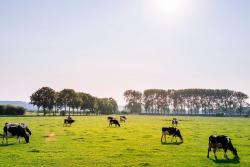Research into Low Carbon Energy and Environment enters new phase
 Professor Julia Jones.Professor Julia Jones from Bangor University has been appointed as the new Director of the Welsh Government’s Sêr Cymru National Research Network for Low Carbon Energy and Environment (NRN-LCEE). Prof Jones will continue to build on the network’s excellent research in the environmental and natural sciences as she takes over this month.
Professor Julia Jones.Professor Julia Jones from Bangor University has been appointed as the new Director of the Welsh Government’s Sêr Cymru National Research Network for Low Carbon Energy and Environment (NRN-LCEE). Prof Jones will continue to build on the network’s excellent research in the environmental and natural sciences as she takes over this month.
Professor Jones will take over the role from Professor David N. Thomas, also of Bangor University, who led the national network during its first highly successful phase between 2013 and 2019.
Professor Jones said: “I am delighted to be leading this vitally important research network which is tackling some of the most important challenges faced by our planet. The work done during the first phase shows how world-leading environmental science here in Wales is, and I’m looking forward to working closely with partner universities, the Welsh Government and other stakeholders in taking the network forward.”
The first phase researched and developed policy-relevant solutions to major challenges, including how to provide food to the world’s population as the climates change, delivering low carbon energy solutions which make use of the power of the sea and geothermal energy, and taking inspiration from nature to improve the built environment.
Professor David N Thomas said: “Establishing the network was a bold, innovative initiative for Welsh research funded by Welsh Government and the Higher Education Funding Council for Wales (HEFCW) as part of the Sêr Cymru 1 funding initiative.
“During the first 6 years of the project we brought together 71 partners from the Europe, North America, the Middle East and the South Pacific. They included research institutions, government bodies, small-to-medium enterprises and industry. As a result, Welsh institutions won competitive funding for 97 projects and combined to lever £33 million worth of research funding.”
 One strand of the research, ‘Cleaner Cows’, identified more sustainable milk and beef production methods which will help to minimise environmental impact while ensuring that productivity isn’t compromised. Another, ‘Climate Smart Grass’, looked at the impact of floods and droughts on fields and farming grasslands. The ‘Resilcoast’ researchers investigated saltmarshes, valuable coastal resources with rising seawater levels due to climate change.
One strand of the research, ‘Cleaner Cows’, identified more sustainable milk and beef production methods which will help to minimise environmental impact while ensuring that productivity isn’t compromised. Another, ‘Climate Smart Grass’, looked at the impact of floods and droughts on fields and farming grasslands. The ‘Resilcoast’ researchers investigated saltmarshes, valuable coastal resources with rising seawater levels due to climate change.
NRN-LCEE funded research also examined how we can reduce our carbon emissions at a time of ever-increasing demand for energy by using tide and wave generated energy, an area in which Wales is already a potential world leader.
The NRN-LCEE http://www.nrn-lcee.ac.uk/ is one of three originally established to address each of the three Grand Challenge research areas identified in the 'Science for Wales' strategy, the other two being the NRN for Advanced Engineering and Materials (led by Swansea University) and NRN for Life Sciences and Health (led by Cardiff University). The second phase of these networks is being supported by Ser Cymru II, which is part funded by the European Regional Development Fund, through the Welsh Government.




